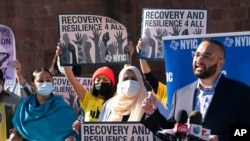The incoming administration of President-elect Joe Biden could swiftly reverse an array of President Donald Trump’s immigration policies, many of which remain among the most contentious initiatives of his administration.
Biden could overturn many guidelines using the same mechanism Trump employed to implement them: executive orders. Others, however, will require more than a policy declaration, experts say.
In the last four years, Trump authored more than 400 regulatory actions through his executive power.
Michele Waslin, program coordinator at the Institute for Immigration Research at George Mason University in Virginia, told VOA the list includes sweeping travel restrictions, changed immigration enforcement priorities, overhauled asylum rules, an emergency declaration for border wall construction and successively reduced caps on refugee admissions.
“In theory, presidential proclamations and executive orders can be rescinded by the new president; however, in many cases, the change will not be immediate since people will need to be installed in the agencies, guidance and field manuals must be updated, and plans will need to be made to carry out the changes,” she said.
Waslin said undoing other policies is expected to be more complex.
"Policies that were changed through regulations will likely require new regulations and a new public comment period,” she explained.
The first 100 days
Within the first 100 days, Biden is expected to repeal Trump’s executive order that barred most nationals from certain countries from visiting the United States. Initially, the restrictions targeted citizens of some majority Muslim nations, but they were expanded to include other countries Washington regards as security threats.
The latest order includes Myanmar (Burma), Eritrea, Kyrgyzstan, Nigeria, Sudan, Tanzania, Iran, Libya, Somalia, Syria and Yemen, along with Venezuela and North Korea.
Another change that experts said would be simple to make is reopening the DACA program to all qualified applicants.
DACA is short for Deferred Action for Childhood Arrivals, a program launched by the Obama administration that shields from deportation people brought illegally to the United States as minors.
Under the Trump administration, U.S. Citizenship and Immigration Services (USCIS) stopped accepting new DACA applications.
In 2019, the Trump administration proposed a plan promising a "fair, modern and legal" overhaul of the American immigration system. It did not address the DACA program and Congress did not act on it.
It is widely expected that a Biden administration will extend protection from deportation as well as work authorization to hundreds of thousands of additional unauthorized immigrants who arrived as children.
“The Supreme Court had already ordered USCIS to begin processing DACA applications again, but they have not done so. The new administration should be able to reopen the application process; however, a legislative solution is needed to truly offer permanent protection to that group of people who arrived in the U.S. as young children,” Waslin said.
Public charge
According to a report by the Migration Policy Institute (MPI), reversing the USCIS’s public-charge regulation will require more than the stroke of a pen. The agency likely would have to go through a notice and public comment period.
The public charge rule, or the wealth test, as critics call it, seeks to determine whether an immigrant is likely to rely on America's public assistance programs. Although the rule is not a new concept and has been on the books for more than 20 years, the Trump administration is making actual use of it far more than its predecessors did.
Biden has also vowed to send Congress legislation to provide legal status to many undocumented immigrants in the country.
“Yet seeking congressional action on one of the most contentious immigration issues would inevitably be a challenging first step for the new administration, even as public support for immigration overall has risen to the highest recorded,” MPI reports.
Refugee program
The United States has for years taken in tens of thousands of refugees, but under the Trump administration, admissions have reached a record low.
Biden is expected to raise the refugee cap for fiscal 2021, which the Trump administration set at 15,000. During the campaign, Biden pledged a refugee admissions ceiling of 125,000.
"Dramatic cuts to refugee admissions have hit the network of nonprofit agencies that do the work of refugee resettlement hard. Resettlement capacity has decreased nearly 40 percent since FY 2017,” MPI noted, adding that, before leaving office, former President Barack Obama set the number at 110,000.
MPP and asylum rules
Trump’s oft-repeated pledge to halt illegal immigration and get control of America’s southern border spawned an array of policies and regulations that narrowed access to humanitarian protections for migrants.
They included Migrant Protection Protocols (MPP), also known as the Remain in Mexico policy, which forced thousands of migrants to stay in Mexican border cities while awaiting immigration court hearings in the United States. The administration also restricted asylum for immigrants who traveled through Central American countries if they failed to apply for protection in a transit nation before arriving at a U.S. port of entry.
Undoing the MPP and reinstating asylum protection will be the most difficult, experts predict.
“I believe the Trump administration's actions toward refugees, asylees and others seeking humanitarian assistance will be felt for a very long time,” Waslin said. “It will take a while for the U.S. to reassert its leadership and provide the assistance it can to people suffering around the world.”
The Trump administration has defended MPP as preventing overcrowding in U.S. migrant detention facilities.
In an upcoming article, VOA immigration reporter Aline Barros will examine possible changes to H-1B regulations, international student visas, border wall construction and migrant detention in a Biden administration.








